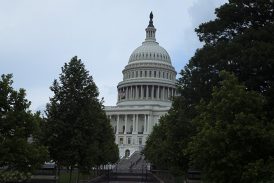Unanimous 9-0 decision in Fulton v. Philadelphia hailed
WINDSOR TERRACE — A unanimous Supreme Court decision upholding the ability of a faith-based foster care agency to operate according to its faith is being heralded as a statement from the nation’s highest court of its commitment to religious liberty.
The much-anticipated Fulton v. The City of Philadelphia decision was announced on June 17. It mandates that the city of Philadelphia cannot refuse to work with Catholic Social Services of the Archdiocese of Philadelphia because it will not certify same-sex couples as foster parents.
[Related:Fulton v. Philadelphia Decision a ‘Strong Endorsement’ of Religious Freedom]
“This is a strong endorsement of religious freedom from a unanimous Supreme Court,” said Lori Windham, senior counsel at Becket Law, who represented the plaintiffs in the case. “The justices recognize that religious social services of many different faiths can come together to serve their communities and that governments should not restrict them because of their religious beliefs.”
Fulton v. Philadelphia dates back to 2018 when a newspaper story recounted the Archdiocese of Philadelphia’s position that Catholic Social Services would not certify same-sex couples as foster parents. After subsequent calls for an investigation, the city told Catholic Social Services that unless it agreed to certify same-sex couples it would no longer refer children to or renew its contract with the agency.
Catholic Social Services and three affiliated foster parents sued the city on the basis that the decision violated the Free Exercise and Free Speech Clauses of the First Amendment. Chief Justice John Roberts confirmed this belief in his opinion on the case.
“(Catholic Social Services) seeks only an accommodation that will allow it to continue serving the children of Philadelphia in a manner consistent with its religious beliefs; it does not seek to impose those beliefs on anyone else,” Roberts wrote. “The refusal of Philadelphia to contract with (Catholic Social Services) for the provision of foster care services unless the agency agrees to certify same-sex couples as foster parents cannot survive strict scrutiny and violates the Free Exercise Clause of the First Amendment.”
Roberts noted Catholic Social Services does not object to certifying gay or lesbian individuals as single foster parents. No same-sex couple ever sought certification from Catholic Social Services, he added, and if one did they would direct the couple to another agency in the city.

After the decision was made, Toni Simms-Busch — one of the foster parents that filed the suit along with Sharonell Fulton and Cecilia Paul — expressed her gratitude for the decision alongside Windham and Archbishop Nelson Perez of Philadelphia.
“It has been a long journey for me and all of the families supporting Catholic Social Services through this legal battle, but I’m grateful that we can finally rest knowing that the agency that brought my family together can continue to do the same for other families,” said Busch, the mother of two adopted boys.
“Each year, there are families able to care for children that need help,” she added. “They can succeed with the support of an agency that shares and affirms their faith. Keeping Catholic Social Services open ensures that families can be a part of the solution.”
Archbishop Perez said the decision “brings light and relief for children in need of loving homes and for the heroic foster parents who open their hearts and doors to care for them. He then further highlighted that the decision protects religious freedom and celebrates the diversity of religious beliefs in the U.S.
However, others believe this was a narrow decision for a few reasons. Justice Samuel Alito wrote in a concurring opinion, “this decision might as well be written on the dissolving paper sold in magic shops.”
That’s because the city can get around the ruling by eliminating a provision in its contract with Catholic Social Services that gives the commissioner of the department of human services the authority over exemptions from the general anti-discriminatory law. If that were to happen, as Alito noted, “then, voilà, today’s decision will vanish — and the parties will be back where they started.”
Will Haun, counsel at Becket Law, says this is highly unlikely for a few reasons.
“One, taking actions that demonstrate that Philadelphia could just change the contract like that either demonstrates selective enforcement and application, which violates the (First Amendment) free exercise clause, or, more targeting against Catholic Social Services, which would also trigger the free exercise clause,” Haun said.
Another reason some have called the decision narrow is that it didn’t overturn the 1990 case Employment Division v. Smith, which holds that generally applicable laws not targeting religious practices do not violate the free exercise clause.
Haun said the Smith decision “turns the free exercise clause into just a probation on discriminating against religions.”
Andrea Picciotti-Bayer, a lawyer and director of the Conscience Project that supports religious freedom cases said that there was no reason for the court to overturn Smith with this decision because there was enough to resolve the case without doing so. Bayer notes that “the Supreme Court in exercising judicial restraint should normally take the narrow approach to resolving conflict.”
She and Haun both maintain this is still a meaningful win for religious freedom without overturning court precedent.
“What’s significant about the unanimous nature of the case is the signal that it sends to government actors right now and to the public at large that the free exercise of religion, which is specifically enumerated in the First Amendment, is going to be upheld and vindicated by the court,” Bayer said.
Even broader, amid calls to reconfigure the makeup of the Supreme Court, Bayer said the unanimous Fulton v. Philadelphia decision should be a great signal that the system of checks and balances and Supreme Court as it’s currently constructed is working.
